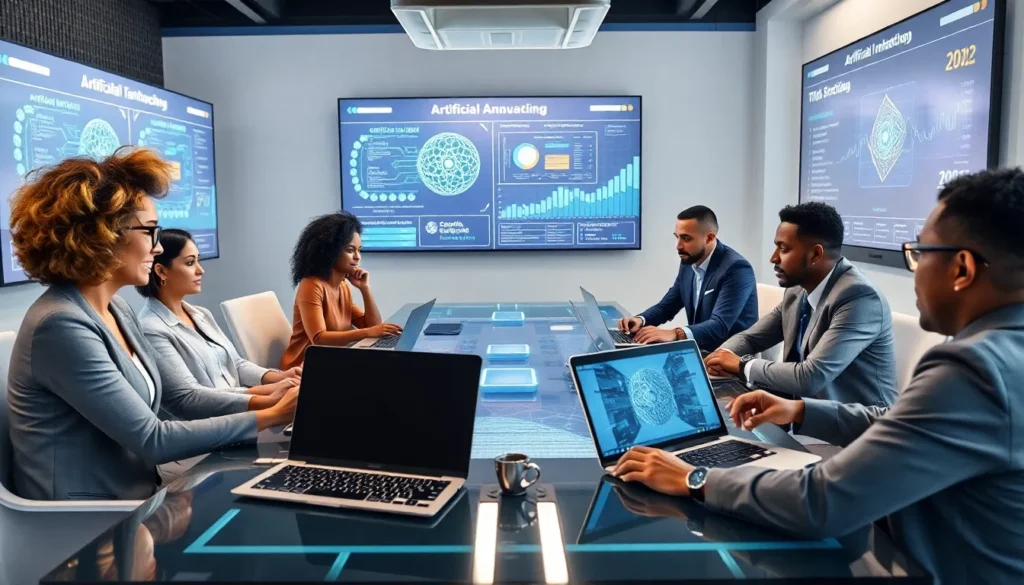Table of Contents
ToggleIn a world where technology evolves faster than a toddler on a sugar rush, keeping up with emerging technologies can feel like trying to catch smoke with your bare hands. From artificial intelligence that can outsmart a chess champion to virtual reality that lets you explore the depths of the ocean without getting wet, these innovations are reshaping how we live, work, and play.
Overview of Emerging Technologies
Emerging technologies encompass advancements that significantly reshape industries and lifestyles. Artificial intelligence (AI) enhances decision-making, automating repetitive tasks with unprecedented accuracy. AI systems learn from data, enabling them to outperform humans in specific areas, including healthcare diagnostics and financial analysis.
Blockchain technology offers secure, transparent record-keeping. Its applications extend beyond cryptocurrencies, enhancing supply chain management and verifying identities. Many organizations leverage blockchain for its decentralized nature, increasing trust in digital transactions.
Internet of Things (IoT) connects devices, enabling real-time data exchange. Smart home devices exemplify IoT, allowing users to control appliances remotely. Industries utilize IoT to optimize operations, monitor equipment, and improve customer experiences.
Augmented reality (AR) overlays digital information onto the physical world. AR enhances education, offering interactive learning experiences. Retailers use AR to allow customers to visualize products before purchasing, driving sales and customer satisfaction.
5G technology improves internet connectivity speed and reliability. This advancement supports IoT growth and enables seamless experiences in smart cities. Enhanced connection speeds facilitate innovations in telemedicine, gaming, and autonomous vehicles.
Quantum computing, though still in early stages, holds groundbreaking potential. It processes massive amounts of data at exceptional speeds, solving complex problems beyond the capability of traditional computers. Researchers and companies explore applications in drug discovery and cryptography.
These technologies represent a glimpse into a rapidly evolving landscape. Each plays a critical role in driving innovation across various sectors, underscoring the importance of adaptability in this fast-paced environment.
Artificial Intelligence and Machine Learning

Artificial intelligence (AI) and machine learning (ML) lead technological advancements across industries, driving innovation and efficiency. These technologies offer transformative capabilities that industries leverage for enhanced performance.
Applications in Various Industries
Healthcare utilizes AI for diagnostics, enabling faster and more accurate disease identification. Finance applies machine learning algorithms for fraud detection, analyzing patterns and anomalies in real time. Retail enhances customer experiences through AI-driven chatbots and personalized recommendations. Manufacturing employs AI in predictive maintenance, reducing downtime and optimizing operations. Transportation integrates machine learning for route optimization and self-driving vehicles, improving safety and efficiency.
Future Trends
The integration of AI and machine learning into everyday tasks is expected to grow. Enhanced natural language processing will enable more intuitive human-computer interactions. Advancements in AI ethics will shape responsible development and usage while addressing biases. Industries will adopt AI solutions for predictive analytics, streamlining decision-making processes. Innovations in neural networks are anticipated, allowing for deeper insights and more complex data analysis.
Blockchain Technology
Blockchain technology revolutionizes data management with secure, decentralized systems. It enhances transparency and trust across various sectors, making it a critical component of modern digital infrastructure.
Use Cases in Finance
Blockchain streamlines financial transactions through faster processing and reduced costs. It eliminates intermediaries like banks, facilitating peer-to-peer asset transfers. Cryptocurrency exchanges leverage blockchain for secure trades and instant settlements. Smart contracts automate agreements, eliminating the need for third-party enforcement. Innovative financial institutions explore blockchain to enhance security and combat fraud. With enhanced control over assets, users experience increased financial autonomy.
Impact on Supply Chain Management
Supply chain management benefits significantly from blockchain’s ability to provide real-time visibility. It tracks products from origin to destination, ensuring accountability at each stage. Companies utilize blockchain for authenticating origins, combating counterfeit goods effectively. Automated tracking reduces delays and improves efficiency by streamlining audits and compliance. Multinational corporations monitor their supply chains for ethical practices through transparent reporting. Enhanced collaboration between supply chain partners creates stronger relationships, driving overall business success.
Internet of Things (IoT)
The Internet of Things (IoT) represents a network of interconnected devices that share data in real-time, enhancing efficiencies and experiences across various sectors. This technology drives significant advancements in both consumer and industrial applications.
Smart Home Devices
Smart home devices exemplify how IoT enhances everyday life. Thermostats can automatically adjust settings based on user preferences. Security cameras allow remote monitoring through mobile apps. Smart speakers facilitate hands-free control of various home systems. These devices enhance convenience and provide energy-saving capabilities, improving overall quality of life. Research indicates that the global smart home market reached $80 billion in 2022 and is expected to grow annually by 27%. Innovations continue to emerge, enabling seamless integration and control for a connected living space.
Industrial IoT Applications
Industrial IoT applications transform manufacturing and logistical operations. Factories harness sensors to monitor equipment health, allowing for predictive maintenance and reducing downtime. Supply chains utilize IoT for real-time tracking of goods, enhancing visibility and efficiency. Enhanced data analysis drives insights for optimizing production processes. Furthermore, companies adopting IoT solutions report decreased operational costs and improved safety standards. The global Industrial IoT market is anticipated to reach $200 billion by 2025, highlighting the significance of this technology in shaping industry standards and practices.
Augmented and Virtual Reality
Augmented reality (AR) and virtual reality (VR) are rapidly transforming how people interact with information and each other. They create immersive environments that enhance education and customer engagement.
Transforming Education
AR technology offers interactive learning experiences that captivate students’ attention. Students using AR tools can visualize complex concepts, like anatomy or geometry, in a 3D format, leading to improved comprehension. In 2022, the AR in education market reached $1.1 billion, and projections show continued growth as more educational institutions adopt these resources. VR simulates real-world environments, allowing students to practice skills safely, especially in fields like medicine and engineering. Medical students, for example, can conduct virtual surgeries without risks, enhancing their preparation before entering real operating rooms.
Enhancing Customer Experience
Retailers leverage AR to create engaging shopping experiences that drive sales. Customers, for instance, can virtually try on clothes or visualize how furniture fits into their homes. In 2023, 40% of consumers reported positive experiences using AR apps while shopping, highlighting its effectiveness. Brands are also utilizing VR to create immersive storytelling experiences, allowing customers to explore products in dynamic environments. Travel companies offer virtual tours of destinations, helping customers make informed choices before booking trips. These innovations not only increase customer satisfaction but also foster brand loyalty, proving the significance of AR and VR in modern commerce.
Emerging technologies are reshaping the world in profound ways. From artificial intelligence’s role in enhancing decision-making to blockchain’s impact on secure transactions, these innovations are driving efficiency and transparency across various sectors. The Internet of Things is connecting devices like never before, optimizing operations and improving everyday experiences.
As augmented reality and virtual reality transform education and retail, they create more engaging interactions for users. With the rise of 5G and the potential of quantum computing, the pace of change is only expected to accelerate. Adapting to these advancements will be crucial for individuals and businesses alike, ensuring they stay competitive in an ever-evolving landscape.







